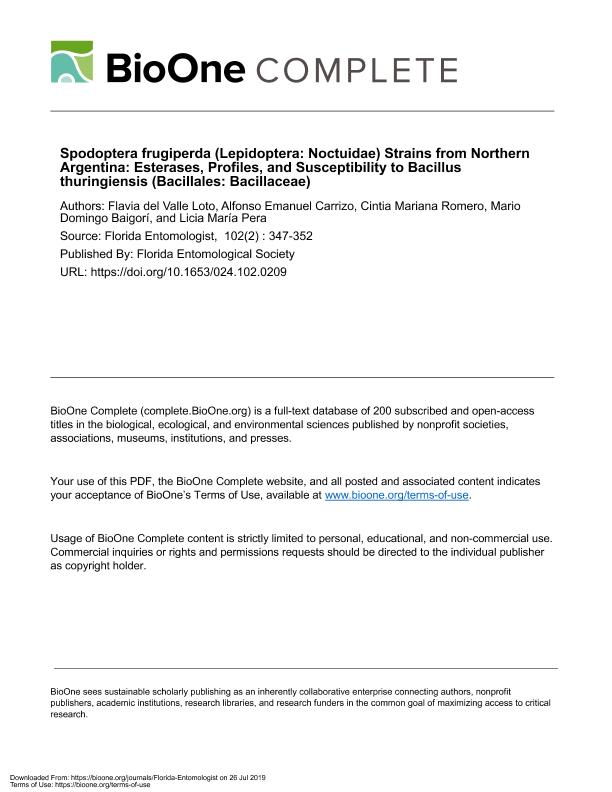Artículo
Los insecticidas preparados a base de Bacillus thuringiensis (Bt) (Berliner) (Bacillales: Bacillaceae) son muy utilizados para el control de Spodoptera frugiperda (J.E. Smith) (Lepidoptera: Noctuidae) en cultivos de gran importancia, tales como el maíz, el algodón y la soja. Sin embargo, hay poca información acerca de la toxicidad de estas formulaciones hacia las cepas maíz y arroz de S. frugiperda, las cuales son morfológicamente indistinguibles, y por ello, son identificadas utilizando técnicas de biología molecular. El principal objetivo de este trabajo fue evaluar la susceptibilidad de larvas del tercer estadio de ambos biotipos de S. frugiperda hacia formulados elaborados con la cepa nativa Bt RT o con la cepa de referencia Bt HD1 subsp. kurstaki (Btk). Asimismo, ambas poblaciones de S. frugiperda fueron caracterizadas teniendo en cuenta el perfil de esterasas en geles de polyacrilamnida permitiendo su identificación. Con respecto a los ensayos de susceptibilidad, en los tratamientos realizados con Bt RT se observaron diferencias significativas entre los datos de mortalidad de algunas de las colonias correspondientes al biotipo maíz o al biotipo arroz. Pero cuando se utilizó el formulado a base de Btk HD1, no se detectó una diferencia significativa entre los valores de mortalidad de las poblaciones que comparten el mismo biotipo de la plaga. Por otro lado, cuando se comparó la toxicidad de la cepa nativa Bt RT o la cepa de referencia Btk HD1 hacia cada biotipo de S. frugiperda, se encontraron diferencias significativas en los valores de mortalidad tanto en la cepa maíz como arroz de S. frugiperda. Finalmente, el análisis estadístico de los valores de mortalidad revela que hubo una diferencia significativa entre los dos biotipos de la plaga, independientemente de la preparación de Bt utilizada. Estos resultados muestran que el control de S. frugiperda podría depender no sólo del bioinsecticida utilizado sino también del biotipo de la plaga que se desea combatir. Spray products based on Bacillus thuringiensis (Bt) (Berliner) (Bacillales: Bacillaceae) are widely used as control agents of the fall armyworm, Spodoptera frugiperda (J.E. Smith) (Lepidoptera: Noctuidae), in some major crops such as corn, cotton, and soy. However, there is little information about the toxicity of Bt formulations to control corn and rice-infesting S. frugiperda strains. These S. frugiperda strains are morphologically indistinguishable, so they are genetically identified as corn and rice S. frugiperda strains. The main objective of this study was to evaluate the susceptibility of third instar larvae of both S. frugiperda biotypes to either the native Bt RT or the reference Bt HD1 subsp. kurstaki (Btk) formulations. In addition, the S. frugiperda populations were characterized by their esterase profile in polyacrylamide gels. This study also allowed differentiation of the S. frugiperda strains. Concerning the susceptibility assays, a significant difference in mortality values was found within some corn or rice S. frugiperda colonies when Bt RT treatment was used, whereas there were no significant differences in Btk HD1 toxicity within colonies that share the same biotype. When toxicity of either the native Bt RT or the reference Btk HD1 to each S. frugiperda biotype was compared, significant differences in mortality values also were found in the corn and the rice S. frugiperda strains. Finally, the statistical analysis of the mortality data revealed that there was a significant difference between the 2 S. frugiperda strains, regardless of the Bt preparation. These results show that the S. frugiperda control could depend not only on the bioinsecticide used, but also on the S. frugiperda biotype being treated.
Spodoptera frugiperda (Lepidoptera: Noctuidae) Strains from Northern Argentina: Esterases, Profiles, and Susceptibility to Bacillus thuringiensis (Bacillales: Bacillaceae)
Loto, Flavia del Valle ; Carrizo, Alfonso Emanuel
; Carrizo, Alfonso Emanuel ; Romero, Cintia Mariana
; Romero, Cintia Mariana ; Baigori, Mario Domingo
; Baigori, Mario Domingo ; Pera, Licia Maria
; Pera, Licia Maria
 ; Carrizo, Alfonso Emanuel
; Carrizo, Alfonso Emanuel ; Romero, Cintia Mariana
; Romero, Cintia Mariana ; Baigori, Mario Domingo
; Baigori, Mario Domingo ; Pera, Licia Maria
; Pera, Licia Maria
Fecha de publicación:
06/2019
Editorial:
Florida Entomological Society
Revista:
Florida Entomologist
ISSN:
0015-4040
Idioma:
Inglés
Tipo de recurso:
Artículo publicado
Clasificación temática:
Resumen
Palabras clave:
BIOCONTROL
,
BIOTYPES
,
BT FORMULATION
,
ESTERASES
,
FALL ARMYWORM
,
MORTALITY
Archivos asociados
Licencia
Identificadores
Colecciones
Articulos(PROIMI)
Articulos de PLANTA PILOTO DE PROC.IND.MICROBIOLOGICOS (I)
Articulos de PLANTA PILOTO DE PROC.IND.MICROBIOLOGICOS (I)
Articulos(SEDE CENTRAL)
Articulos de SEDE CENTRAL
Articulos de SEDE CENTRAL
Citación
Loto, Flavia del Valle; Carrizo, Alfonso Emanuel; Romero, Cintia Mariana; Baigori, Mario Domingo; Pera, Licia Maria; Spodoptera frugiperda (Lepidoptera: Noctuidae) Strains from Northern Argentina: Esterases, Profiles, and Susceptibility to Bacillus thuringiensis (Bacillales: Bacillaceae); Florida Entomological Society; Florida Entomologist; 102; 2; 6-2019; 347-352
Compartir
Altmétricas



